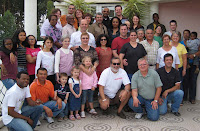Portugal has a big passion for soccer, because it’s our national sport and, although we are a small country, we have excellent players that are in some top-soccer teams around Europe including Manchester United, Chelsea, Real Madrid and in the past also in Inter Milano, Milan, Barcelona, Paris S.G., etc.
Everytime our national soccer team makes it to the final tournement, either the EURO or the WORLD CUP ( and lately, we have always been...) the country “stops”, with no more talks about politics, or economy, or sadness, because IT’S SOCCER TIME!!!
People will hang-out in friends of family homes, outdoor events, barbecuing sardines, porkchops, portuguese sausage...anything will go, during this soccer event. It is fun, it’s very relational, and above all it’s PORTUGAL that is playing!!!
You can imagine that Portugal’s expectations are different that the “big guys”, like Spain, France, England, Italy, Germany, Rússia... for all these teams, if they are not champions it’s always a loss, but for “little” Portugal, that we are in the semi-finals is already “our championship” and so getting to this level in the Euro Cup is huge, and puts our country into high spirits, with lots of excitement. We are so proud of our country!
 Tomorrow, once again, we will be playing to get a place in the EURO 2012 finals, and with what country would we have to again play? Our good old “enemy” for centuries (of course it doesn’t get actually to that level, and normally everytime we play it’s always very calm and respectful)---Spain.
Tomorrow, once again, we will be playing to get a place in the EURO 2012 finals, and with what country would we have to again play? Our good old “enemy” for centuries (of course it doesn’t get actually to that level, and normally everytime we play it’s always very calm and respectful)---Spain.
It will happen one of two things:
· If we win, Portugal will stop and celebrate until the final game, and everybody will forget our situation right now, and it will be extremely good for our “ego” and maybe our economy actually will get a boost!!!
· If we lose, well, we will be a bit sad, because we lost, and lost once again, to Spain.
But, we’ll be fine, pleased, because we did once again great in soccer, and we, once again, will be in the TOP 4 best soccer teams in Europe...and that’s very good for us. If we didn’t win, we will be on the top.
And this is the way, us, the Portuguese see soccer and sports and life!























